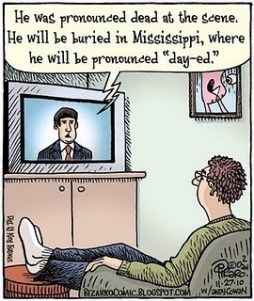Distinguish Your Characters With Dialect
Before you jump to Jan R’s post on learning to distinguish characters with dialogue, let me precaution you:
characters by adding dialect. However, good dialect is difficult to write.1
Even well-written dialect can distract from the flow of the story. When I use it, I highlight one or two key mannerisms (“you all” or “you guys” instead of you. Only in extreme circumstances would I use “y’all” or “youse guys.”) When your readers have to slow down to process complex dialect, you’ve exchanged indistinguishable characters for awkward, plodding prose.
The same goes for creating world vocabularies. The Dune series worked the motif to death by the last book. The world’s moved on. Yes, there are readers that expect fifty glossary pages at the end of the book. Those readers rarely stray from formula fiction, Many readers hate wading through ponderous prose forcing us to turn to the back. It’s one of the first reasons we pass on to the next book.That being said, once you finish your first draft, it’s time to look at your dialogue. If all your characters sound the same, readers find it difficult to follow the novel.
Jan R shares her experiences learning to write distinguishable character dialogue.
For instance, one first time writer slaved to write jive turkey dialect for the only black character in his novel. I pointed out that his character was Harvard educated and wouldn’t be caught dead talking like a character from a blacksploitation film (not to mention the questionable judgment of having the only black character both jive-talking and Harvard educated). Rather than rewriting the dialogue, he chose to insert a line where his character said he “talked jive to fuck with the man.” Some readers may buy it. If they never finished high school.back
 Writing your first novel-Things you should know
Writing your first novel-Things you should know
 Do your characters have their own voice or do they sound the same? I had a critique partner tell me that she couldn’t distinguish characters in my manuscript based on dialogue. They all sounded the same. If I hadn’t provided a dialogue tag, she would have had no idea which character was speaking. She was right.
Do your characters have their own voice or do they sound the same? I had a critique partner tell me that she couldn’t distinguish characters in my manuscript based on dialogue. They all sounded the same. If I hadn’t provided a dialogue tag, she would have had no idea which character was speaking. She was right.
This was something I definitely had to correct. So I did some research, watched a webinar, and took a class on dialogue. Distinguishing between characters is a lot easier than you would think.
One way to differentiate characters and determine who they are is through dialect. We can learn a lot about a person based on their accent, grammar, and choice of words.
You don’t have to ask a person if they are from the North or South-just listen to how they speak and note their word choices. While this is one of the most obvious examples for me, you…
View original post 258 more words


Wind Eggs
As much as I admire Plato I think the wind eggs exploded in his face and that art and literature have more to tell us, because of their emotional content, than the dry desert winds of philosophy alone. ...more
- Phillip T. Stephens's profile
- 31 followers



